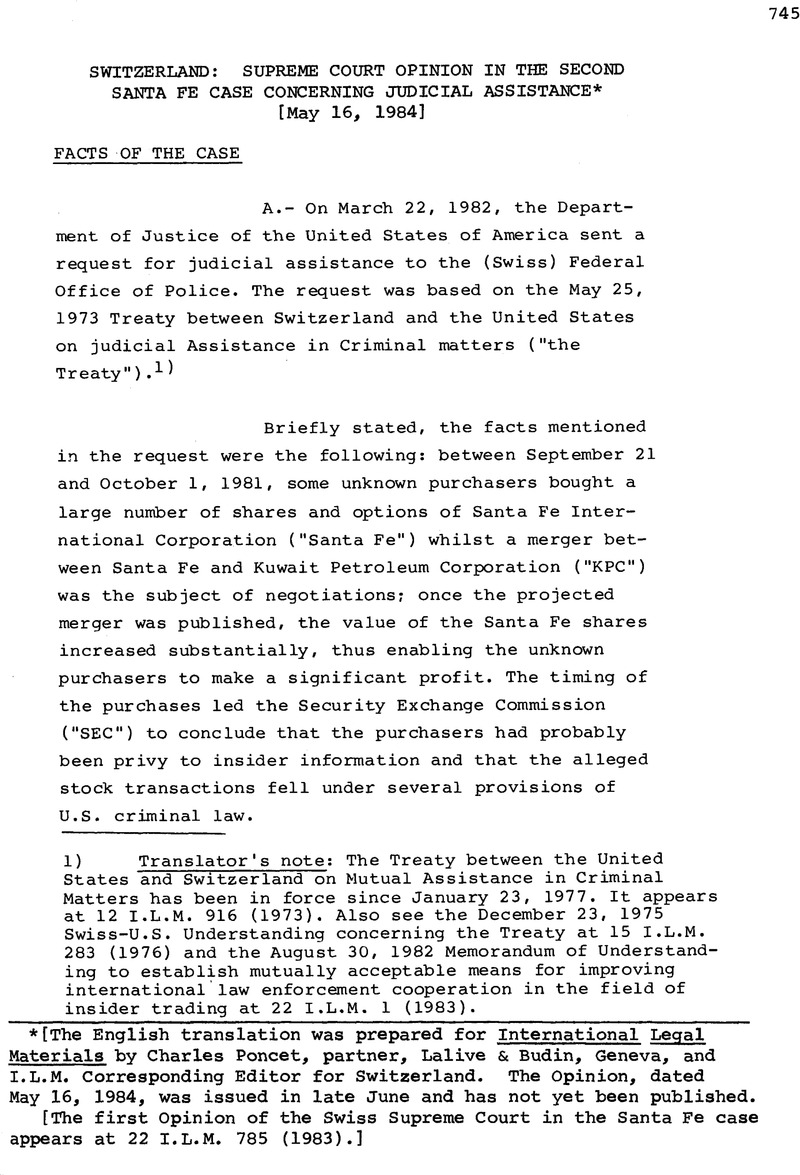No CrossRef data available.
Published online by Cambridge University Press: 04 April 2017

* [The English translation was prepared for International Legal Materials by Charles Poncet, partner, Lalive & Budin, Geneva, andI.L.M. Corresponding Editor for Switzerland. The Opinion, datedMay 16, 1984, was issued in late June and has not yet been published.
[The first Opinion of the Swiss Supreme Court in the Santa Fe caseappears at 22 I.L.M. 785 (1983).]
1 Translator's note: The Treaty between the UnitedStates and Switzerland on Mutual Assistance in CriminalMatters has been in force since January 23, 1977. It appearsat 12 I.L.M. 916 (1973). Also see the December 23, 1975Swiss-U.S. Understanding concerning the Treaty at 15 I.L.M.283 (1976) and the August 30, 1982 Memorandum of Understandingto establish mutually acceptable means for improvinginternational law enforcement cooperation in the field ofinsider trading at 22 I.L.M. 1 (1983).
2 Translator's note; A Swiss Canton is similar to aU.S. State. In the Swiss system, requests for internationaljudicial assistance are screened by a federal agency (theFederal Office of Police). If the request meets the primafacie requirements of Swiss or international law, its executionis then entrusted to the State (Canton) Authoritiesin the city where the documents or witnesses are located.
3 Translator's note; The Federal Tribunal is the Supreme Court of Switzerland.
4 Translator's note; an English summary of the first Opinion of the Swiss Supreme Court in the Santa Fe case appears at 22 I.L.M. 785 (1983).
5 Translator's note; double incrimination means thatthe facts mentioned in the request must prima facie be foundto be an offence under Swiss law as well as U.S. law.
6 Translator's note; under Art. 162 of the (Swiss)Federal Criminal Code, revealing to a third party a trade ora manufacturing secret or using the disclosure of such asecret is an offence which can be punished with a fine of upto SF 40,000 (about US$ 16,000) and/or with a jail term of3 days to 3 years.
7 Translator's note: the rather odd finding of theSwiss Supreme Court in the first Santa Fe Opinion was that amember of the Board would not be violating Swiss criminallaw if he bought shares of his company when he knew that itwas going to be merged with another company, but that athird party (tippee) using such information would fall underArt. 162 of the Swiss Criminal Code.
8 Translator's note: The Federal Council is the executive powerin the Swiss system. It consists of seven members elected by the Swiss Parliament.
9 Translator's note: in Swiss administrative law, acivil servant who is asked to decide a legal matter may bechallenged if he has already expressed an opinion in thecase. This is somewhat similar to a challenge broughtagainst a sitting judge who would have already expressed anopinion on the issues he would be asked to decide.
10 Translator's note; the November 30, 1983 opinion ofthe Swiss Supreme Court deals with matters of Swiss administrativelaw and has no international interest.
11 Translator's note: Under Articles 97 through 115 of theSwiss Federal Statute organizing Federal Courts of December 16,1943 (“Loi federale d'organisation judiciaire“; “Bundesgesetziiber die Organisation der Bundesrechtspflege“) (hereafter “theStatute“), the decisions of various federal administrativeagencies can be challenged by a direct appeal to the SwissSupreme Court. This type of appeal is known as “appeal ofadministrative law” (“recours de droit administratif“;“Verwaltungsgerichtsbeschwerde“).
12 Translator's note: Art. 17(3) of the aforesaidStatute organizing Swiss Federal Courts reads as follows:“The Court may ban the public from the hearing, either inpart or totally, in the interest of national security, ofpublic order or of good morals, or when a commanding interestof one of the parties or of a third party so requires.”
13 Translator's note; in the Swiss system, the importantdecisions of the Swiss Supreme Court are reached in apublic exchange of opinions between the five Supreme Courtjudges of the Section of the Supreme Court dealing with thecase. Whilst there are no dissenting opinions under Swisslaw, following the discussions among the judges can be ofthe greatest interest to legal scholars and practitioners.In the Santa Fe case, the discussion was thus held in public,with several lawyers and other interested parties inattendance, but the names of the petitioners were not disclosed.in the Swiss system. However, in order to qualify forjudicial review, a petitioner must establish, among otherthings, a legitimate interest in seeking judicial remediesagainst a decision issued by an administrative agency.
14 Translators note: the writ of certiorari is unknownin the Swiss system. However, in order to qualify forjudicial review, a petitioner must establish, among otherthings, a legitimate interest in seeking judicial remediesagainst a decision issued by an administrative agency.
15 Translator's note: Art. 106 contains a 30-daydeadline to file an appeal to the Supreme Court. Practitionersgenerally consider that this is far too short incomplicated matters.
16 Translator's note: literally, the Court used thesingular for each petitioner. For the sake of clarity,however, the translation refers to “petitioners” in theplural.
17 Translator's note; one may wonder whether theFederal Tribunal really meant to say that a foreign Statecould indefinitely harass a defendant by renewed requestsfor judicial assistance based on alleged “new” findings.
18 Translator's note: under Art. 171 of the SwissCriminal Code, carrying out acts of authority on Swissterritory on behalf of a foreign State without authorizationof the competent Swiss Authority is subject to a jail termof a maximum of 3 years or, in serious cases, of a maximumof 20 years. Art. 271 further provides that inducing aperson to go abroad in order to enable a foreign authorityto arrest that person carries a jail term of a maximum of20 years.
19 Translator's note: here the Court cited its firstdecision at Chapter 3(a) of the French text. See 22 I.L.M.788 (1983) under 3(a) for the corresponding English quote.
20 Translator's note: i.e. Switzerland.
21 Translator's note; German for “serious offence”
22 Translator's note: German for “meaning of the action” (taken by someone).